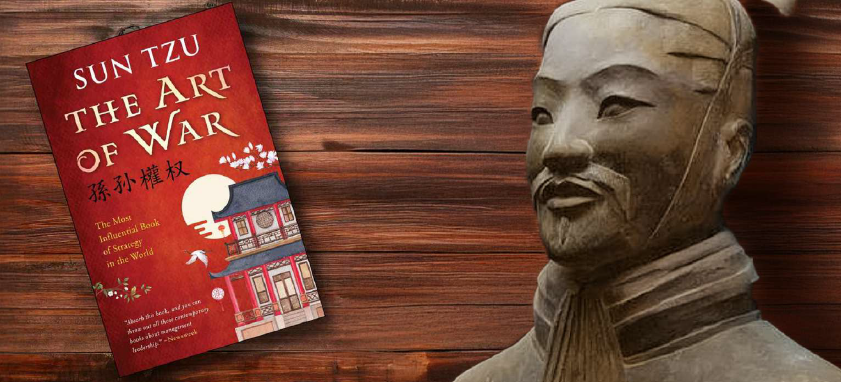The Art of War is an ancient Chinese military treatise written by the Chinese General and strategist Sun Tzu over 2,500 years ago. Despite its age, the book remains one of the most influential texts on strategy, warfare, leadership, and psychological insight. It is composed of 13 short chapters, each focusing on a key aspect of military operations, such as planning, battlefield positioning, managing troops, the use of spies, and the importance of terrain and deception.
One of its central themes is the importance of strategic maneuvering over brute force. Sun Tzu emphasises that victory is not always achieved through open confrontation but often through careful planning, deception, and understanding both the self and the enemy. Another key idea is the value of adaptability; a successful leader must remain flexible, responding to shifting conditions with intelligence rather than stubbornness. Information and intelligence also play a critical role; the use of spies and understanding the enemy intentions is portrayed as essential to success.
The book underlines discipline, unity, and strong leadership, warning that an undisciplined army or a divided command structure leads to defeat. Equally important is the notion of winning without fighting, achieving goals through diplomacy, manipulation, or psychological advantage, all which are considered superior to the cost of war. In all, The Art of War teaches that warfare is not just physical but deeply psychological and political, where foresight, calmness, and clarity of purpose are more powerful than weapons alone.
This timeless manual is not about glorifying war but about mastering the art of strategic thinking to resolve conflict in the most efficient and peaceful way possible. Today, the lessons by Sun Tzu in The Art of War echo across the political and military landscape of Pakistan.
As tensions with India remain high, Pakistan’s defense budget saw a 20 per cent hike in June 2025, now standing at over $9 billion. Maybe this boost is not about war-mongering but strategic deterrence. Pakistan is investing in air defense systems, drones, cyber warfare units, and missile capabilities, a posture that aligns with Sun Tzu’s warning:
‘He will win who knows when to fight and when not to fight.’ Rather than initiating confrontation, Pakistan is focused on raising the cost of any aggression. Its upgraded defense capability enhances readiness without recklessness, exactly what Sun Tzu advocated.
Rather than initiating confrontation, Pakistan is focused on raising the cost of any aggression. Its upgraded defense capability enhances readiness without recklessness, exactly what Sun Tzu advocated.
While Pakistan’s defense sector continues to receive massive funding, the country’s deepening economic fragility poses a more pressing and long-term threat. The strain of rising inflation, reliance on IMF loans, and entrenched poverty has pushed large segments of the population into severe hardship and unrest. As state resources deplete, Pakistan increasingly turns to international lenders to sustain its operations, compromising economic sovereignty and placing the burden of re-payment on a public that gains little from such spending.
Sun Tzu rightly said, ‘Poverty of the state exchequer causes an army to be maintained by contributions from a distance which causes the people to be impoverished.’
Over 2,500 years ago, Sun Tzu warned that sustaining an army from afar, burdens the people. In his time, this meant to seek resources from regions within one’s own country where there is no conflict. In today’s world, it translates into taking foreign loans or aid to fund defense and state functions.
Pakistan must strike a balance between guns for national defense and bread for poor people. Pakistan’s current military head, General Asim Munir, now elevated to Field Marshal, is a dominant figure in national affairs. While projecting unity and control, cracks are visible such as the ongoing trials of senior military officers and reports of internal dissent within the army. According to the Sun Tzu’s warning; ‘If there is no discipline, the army will be ruined.’
Beside these issues, digital censorship is on its peak, as there is an intensified crackdown on PTI-affiliated channels and those run by journalists (over 2 dozen YouTube channels were banned in July). So, it is obvious that in 2025, warfare is no longer just about borders and bombs but it is about restricting freedom of expression through digital weaponisation.
Therefore, the state should be alert about giving birth to rebellions, as they already have such as the Baloch insurgency.
Sun Tzu emphasised control through deception, silence, and foresight, but also warned: ‘When people no longer trust their leaders, rebellions begin in the heart.’
Suppressing voices may maintain order temporarily, but long-term unity demands legitimacy, dialogue, and reform, not control alone.
The question that now rises in conclusion is: strategy or survival?
Pakistan’s current trajectory shows both strength and strain. On the one hand, it is deploying precision military tactics, forging smart alliances, and building technological deterrence. On the other, it faces internal fragmentation, civil unrest, and economic fragility.
Sun Tzu’s The Art of War is not a book of aggression as per expectation, instead it is a guide to wise survival, to winning without unnecessary sacrifice, and to conquering chaos through clarity.
If Pakistan’s leadership – military and civilian – truly seeks peace, stability, and national dignity, then they must adopt Sun Tzu’s ultimate principle: ‘The greatest victory is that which requires no battle.’



